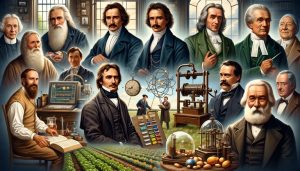“Faith and Innovation: How Christian Beliefs Influenced Great Inventors and Scientists”


Post:
Throughout history, the realms of faith and science have intertwined in the lives of some of the world’s most notable inventors and scientists. This post explores how their Christian beliefs played a significant role in their groundbreaking contributions to various fields of study.
Sir Isaac Newton (1643–1727) – As a towering figure in the Scientific Revolution, Newton’s work on laws of motion and universal gravitation was groundbreaking. His deep religious convictions were evident in his extensive study of the Bible, reflecting a harmonious blend of faith and science.
Robert Boyle (1627–1691) – Known as one of the founding fathers of modern chemistry, Boyle was also a devout Christian. He strongly believed that scientific exploration was a form of worship, enhancing the glorification of God.
Johannes Kepler (1571–1630) – A key astronomer of the Scientific Revolution, Kepler is celebrated for his laws of planetary motion. His scientific endeavors were deeply influenced by his Christian beliefs, showcasing his attempt to understand the universe as part of God’s creation.
Blaise Pascal (1623–1662) – Renowned for Pascal’s Law in physics, Pascal was also a Jansenist thinker. He contributed significantly to both the scientific and theological world, demonstrating a unique intersection of faith and reason.
Charles Babbage (1791–1871) – Often hailed as the father of the computer for inventing the Analytical Engine, Babbage was a devout Protestant. His faith influenced his approach to science and technology.
Michael Faraday (1791–1867) – A key figure in the study of electromagnetism and electrochemistry, Faraday was also a deeply religious man. His work ethic and scientific methodology were very much influenced by his religious beliefs.
Gregor Mendel (1822–1884) – The founder of modern genetics, Mendel was an Augustinian friar. His monastic life and scientific research were intertwined, with his faith guiding his approach to scientific discovery.
George Washington Carver (1860s–1943) – An American scientist and inventor known for his work with peanuts and promoting alternative crops to cotton, Carver’s Christian faith was a central aspect of his life and work.
These individuals represent the harmonious blend of faith and scientific inquiry, showing that deep religious convictions can coexist with, and even inspire, scientific exploration. Their contributions have left a lasting impact on the world, proving that faith and reason can be powerful partners in the quest for knowledge and understanding.
References:
• “34 Great Scientists Who Were Committed Christians” from Famousscientists.org .
• Wikipedia’s “List of Christians in science and technology” .This exploration reveals the profound ways in which faith can inspire scientific inquiry and highlights the significant contributions of these Christian scientists and inventors in shaping our understanding of the world.

